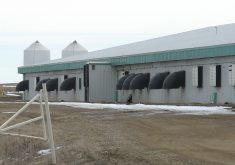The Canadian Wheat Board is prepared to take over financial responsibility for adjustment and other CWB payments in an effort to get money from grain sales into farmers’ hands more quickly.
CWB chair Allen Oberg said the timing of payments is a priority for the board, based on feedback from farmers this fall and winter.
“We have a situation now that can be described as unworkable, especially when you get a rise in the market as we did this year,” he said. “It makes the initial payments look ridiculous.”
Read Also

Phosphate prices to remain high
Phosphate prices are expected to remain elevated, according to Mosaic’s president.
The board is required to provide the government with the market outlook for the Aug. 1 initial payment based on the May Pool Return Outlook, which means they could be way out of date, especially if the market takes off at some point in the summer, as happened this year.
The board asked the government on Sept. 3 to approve an increase in the Aug. 1 initial payment. It then revised that on Sept. 29, asking that the payment be increased. The government approved the increase on Nov. 25.
The board has since filed a request for approval for another increase.
Oberg said the board has the financial capacity to take over the funding of adjustment, interim and final payments through its contingency fund, although the existing $60 million cap on the fund would have to be increased or eliminated. The federal government would retain responsibility for the Aug. 1 initial payment.
The issue will be discussed as part of the board of directors’ coming review of its five-year strategic plan.
The change would also require approval from federal wheat board minister Gerry Ritz.
“We’ve raised the issue with the minister on a number of occasions but it doesn’t seem to be high on their priority list,” said Oberg. “The current system is cumbersome and it would be better for all concerned if we assumed that responsibility.”
In an e-mail statement, Ritz said the government is always looking into ways to get money into farmer’s hands faster.
“That’s why we have introduced legislation to shorten approval times in some cases by half, which the Liberals and NDP have refused to support,” he wrote, adding the government has not received a formal request to look at the option.
The current system requires that federal finance officials approve payment changes, but that can take two weeks to three months.
Oberg said the main risk with the board taking over financial responsibility for initial payments would be the unlikely event that one of the pools incurred a deficit. That last happened in 2002, and there have been only four such deficits in the board’s history.
He acknowledged any increased risk management costs would have to be covered largely by farmers.
Oberg emphasized the board is not looking to the federal government to put additional money into the contingency fund.
The fund totalled $22 million as of July 31, 2010, $3.4 million July 31, 2009 and was in a deficit of $28.9 million on July 31, 2008.














